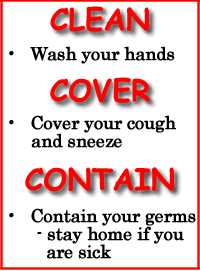|
|
What You Can Do to Stay Healthy
- Stay informed. This website will be updated regularly as information becomes available.
- Influenza is thought to spread mainly person-to-person through coughing or sneezing of infected people.
- Take everyday actions to stay healthy.
- Cover your nose and mouth with a tissue when you cough or sneeze. Throw the tissue in the trash after you use it.
- Wash your hands often with soap and water, especially after you cough or sneeze. Alcohol-based hands cleaners are also effective.
- Avoid touching your eyes, nose or mouth. Germs spread that way.
- Stay home if you get sick. CDC recommends that you stay home from work or school and limit contact with others to keep from infecting them.
- Follow public health advice regarding school closures, avoiding crowds and other social distancing measures.
- Develop a family emergency plan as a precaution. This should include storing a supply of food, medicines, facemasks, alcohol-based hand rubs and other essential supplies.
- Symptoms of swine flu are similar to regular human flu and include:
- Fever
- Cough
- Sore throat
- Body aches
- Headache
- Chills
- Fatigue
- Some people also have reported diarrhea and vomiting associated with swine flu.
For people who have flu-like symptoms and have traveled to areas where swine flu has been confirmed, they should seek medical attention. However, if a person has flu-like symptoms but has not traveled to areas where swine flu has been confirmed, they should stay home and contact a doctor to see if they should go in for testing.
|
 |
State, National and International Links
- Illinois Department of Public Health
- Centers for Disease Control Swine Influenza
- World Health Organization
- Office of Emergency Management and Communication
- U.S. Department of Agriculture
- Local and Area EMA and Social Service Organizations
- Use the map below to locate Organizations.
Personal and Family Preparedness
There are basic steps you can take to ensure you are prepared at home, in your vehicle, and at work. By building an emergency kit, you and your family will have the basic survival items that are necessary during an emergency.
- Download the Disaster Kit brochure for an easy-to-use checklist of items suggested for your kit(s).
- Gather the supplies that are listed. You may need them if your family is confined at home or evacuated.
- Keep the items you would most likely need during an evacuation in an easy-to-carry container (Go Bag), such as a camping backpack or a duffle bag.
For Additional Personal and Family Preparedness Information
|
Statewide Communications Interoperability Plan (SCIP)
 Illinois' first-ever Statewide Communications Interoperability Plan (SCIP) was approved by the U.S. Department of Homeland Security and has been officially accepted by the Illinois Emergency Management Agency, Illinois State Police, Illinois Terrorism Task Force, Illinois Department of Public Health, Illinois Emergency Services Management Association, Illinois Law Enforcement Alarm System, Mutual Aid Box Alarm System, and Chicago/Cook County Urban Area.
Illinois' first-ever Statewide Communications Interoperability Plan (SCIP) was approved by the U.S. Department of Homeland Security and has been officially accepted by the Illinois Emergency Management Agency, Illinois State Police, Illinois Terrorism Task Force, Illinois Department of Public Health, Illinois Emergency Services Management Association, Illinois Law Enforcement Alarm System, Mutual Aid Box Alarm System, and Chicago/Cook County Urban Area.
The plan identifies a statewide strategy that focuses on establishing a single platform so all public safety agencies can share emergency information. The development of the SCIP was a cooperative effort by a consortium of federal, state, and local public safety practitioners working through the Illinois Terrorism Task Force’s Communications Committee and the Statewide Interoperability Executive Committee. Annual reviews/updates to the SCIP will be conducted under the auspices of the Illinois Emergency Management Agency.
|
New online Training registration and tracking application
To better serve our students, IEMA has implemented a new online system that will enable you to register for upcoming classes, track classes you have taken, print your IEMA transcript and more.
For more information on gaining access to the system....Training - Online Registration
|

Severe Weather Preparedness Guide
Tornadoes can strike at anytime, day or night, but can be especially deadly in the middle of the night when many people are asleep. The Illinois Emergency Management Agency (IEMA) and the National Weather Service (NWS) are reminding people that weather radios save lives by providing round-the-clock alerts of imminent dangers.
The Illinois Emergency Management Agency (IEMA) has developed a Severe Weather Preparedness document with tips on staying safe during the severe weather months.
|
|
|
|
|
|



